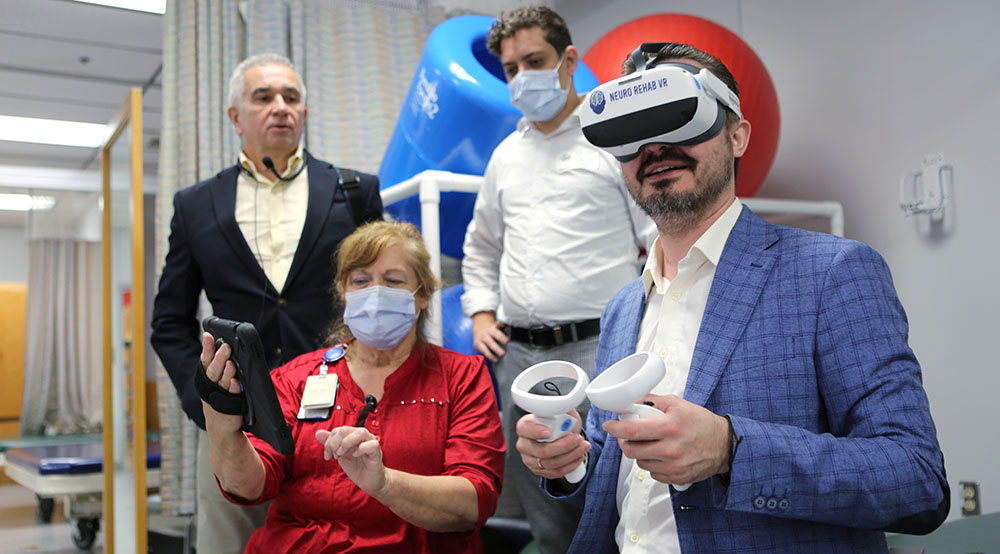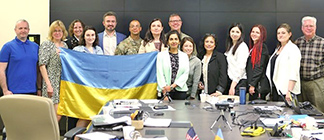South Texas VA hosted a Ukrainian medical delegation in May to show representatives from the war-torn country how VA treats its war-wounded Veterans and families.
The collaboration between VA and the State Department brought the medical delegation to San Antonio, Texas, on a week-long visit to learn more about rehabilitation processes.
The Ukrainians’ focus was mental health, spinal cord, burns and neurological injuries. South Texas was chosen for its rehabilitative capacity because it has one of VA’s five polytrauma centers of care.
In addition to polytrauma, the team visited the Spinal Cord Injury and Disorder unit, prosthetics lab, recreation therapy, and received briefings from amputees, blind Veterans and Prisoners of War from the Vietnam conflict.
Interest in technology
A member of the Ukrainian delegation, Dr. Serhii Kolisnyk, was interested in technology, like assistive bikes and prosthetic limbs. He was an eager volunteer throughout the week, wanting to try everything and hoping to bring that experience back to Ukraine. Pictured above, Dr. Kolisnyk experiences the use of virtual reality.
“This experience was very beneficial and fruitful for us because we have a lot of complex traumas like Spinal Cord Injuries, Traumatic Brain Injures, burns and blinded persons. You have shown us the interdisciplinary or multidisciplinary approaches, and this is very important to pay attention in all directions of rehabilitation,” Kolisnyk said.
Kolisnyk explained that Ukraine is large geographically, like Texas, and they are attempting to build a network of treatment centers.
“We have a big population and every family, every child, every woman, every combatant has some signs of PTSD,” he added.
First-hand testimony
The Ukrainian delegation also included psychiatrists and social workers. Dr. Seth Chandler’s teams set up several panels that addressed PTSD and many of the emotions that go along with traumas.
South Texas prosthetist Jaclyn Astorga, who lost her leg in a car accident, got emotional describing her accident. She told the delegation the different states of mind and challenges she went through, including learning to walk on a prosthetic leg while pregnant.
The delegation also heard emotional and dramatic testimony from two pilots who were shot down and taken prisoner for six years.
Colonel Joe Milligan recalled his capture, describing dislocated joints and burns as he flew through the wreckage of his downed aircraft. “During my torture, I had both shoulders dislocated. It’s been 56 years and there isn’t a day that goes by that I don’t experience pain in both of those shoulders,” Milligan said.
Dr. Thomas Mcnish was also captured and recounted his experience. He was also tortured, but did not fear dying because the Vietnamese wanted to use the airmen as propaganda. He told the Ukrainians his faith kept him going and the Ukrainians who are captured will need the same.
“One of the most important questions I get asked is, ‘How did you survive six and a half years of that type of treatment?’ My faith was a strong contributor to live through and succeed. My faith in a supreme being and my faith in my country and faith in fellow prisoners. Anything you can do to convince your soldiers they will never be forgotten even if they are captured will make a world of difference in their ability to succeed as citizens again,” Mcnish said.
Forging partnerships
The week was brought to a close by Executive Director Dr. Julianne Flynn, who provided her personal challenge coin to each participant. “I admire you and your country so much, and we hope we helped, not only with the knowledge we imparted, but the partnership and love that went into creating this program.”
As the Ukrainians gathered their notes and binders of medical information that will change the future of Ukrainian rehabilitative medicine, they shared a bit of patriotism by singing their national anthem for their American hosts.
Topics in this story
More Stories
Bob Jesse Award celebrates the achievements of a VA employee and a team or department that exemplifies innovative practices within VA.
The Medical Foster Home program offers Veterans an alternative to nursing homes.
Watch the Under Secretary for Health and a panel of experts discuss VA Health Connect tele-emergency care.







